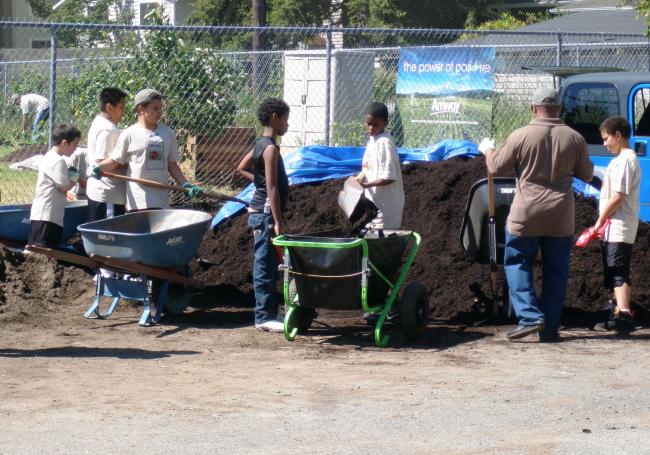Boys & Girls Club grows sustainability, healthy living
Members of the North Seattle Boys & Girls Club dig into a pile of mulch while building a vegetable garden for the club June 12. CLICK IMAGE FOR MORE PHOTOS.
Mon, 06/14/2010
The children of the North Seattle Boys & Girls Club got their hands dirty early June 12 planting vegetable sprouts and shoveling mulch.
The community garden they were building is part of the three-year Positive Sprouts project with the retail company Amway Global. Seven U.S. cities, including Seattle, were chosen to pilot the program intended to educate children about sustainability and healthy living.
“It’s phenomenal when kids grow their own foods," said Jessica Drench, program manager of the Green Eductation Foundation. "You might not believe it, but you see kids sprint to ripe tomato plants, to sugar snap peas, to pick off the vine. Kids are smart, they know it tastes better.”
North Seattle Boys & Girls Club Director Neil Aguiling said he hopes the hands-on learning will teach children how to grow organically and to later develop those homegrown products into healthy meals.
“It’s a really nice marriage with our program," Aguiling said. "Traditionally most child care centers offer a graham cracker, yogurt or something like that, which is great, but we also want to offer them something more substantial. So we cook them meals with fruit or [give them] granola bars and stuff like that. Positive Sprouts has the kind of stuff we can incorporate into our meals very easily. Kids these days don’t really think like that. You buy whatever is cheapest at the store.”
Among the seeds and short stalks planted were tomatoes, broccoli and eggplant. Children will cultivate the gardens as they grow.
“Every morning or every time we’re here, we’re going to go out and water [the garden] and check to see how it’s growing," said 14-year-old Boys & Girls Club member Zara Soares. "Then we’re going to use those foods because a lot of kids here don’t want to eat vegetables. Kids can learn to use them and know that there are some good veggies that you can make good food with.”
Each plant was labeled with a bilingual sign and beds were organized into a pizza, salsa, butterfly and salad garden to help the kids recognize the many different uses for the plants. Drench said the gardens were also developed around the nationalities of the community to involve families in the project.
“We bring the families in because what we find is that our family members – grandparents, aunts, uncles – maybe had a garden when they were younger and got disconnected from that” Drench said. “It creates a community when you build a garden. And really when you plant something from seed or you plant something and it’s two inches tall, a month later it’s up to your knees and that’s exciting.”
The experiential learning will be paired with a curriculum about nutrition and healthy living. The skills developed sowing the community garden will help instill pride and teach healthy food choices.
“I kind of want to see how the food grows, like broccoli grows from the center,” said 15-year-old Artina Ford.
When asked what aspect of the project they were most excited about, Soares and Ford responded in unison: “The food.”





